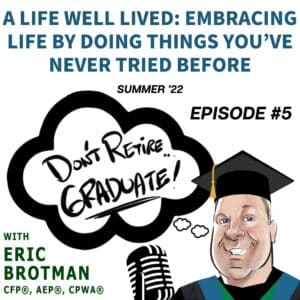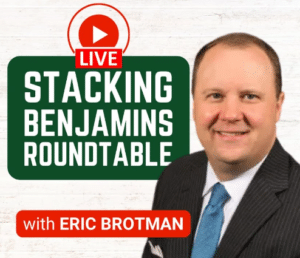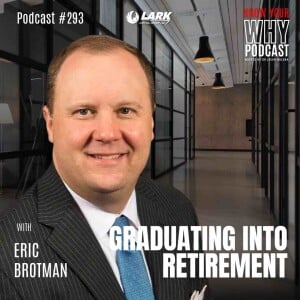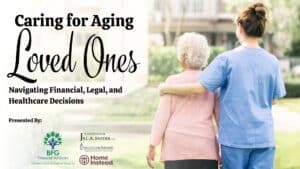Welcome back to Don’t Retire… Graduate! As part of our summer throwback series, we’re bringing back some of our favorite episodes from seasons passed.
This episode, originally released in season 3, features Heidi Herman, author of On with the Butter: Spread More Living onto Everyday Life. At 93 years old, Heidi’s mother made a list of 93 new experiences she wanted to try before she turned 94—from paragliding in Iceland to visiting the Great Barrier Reef to ziplining through the Mall of America. Now, Heidi joins us on the show to talk about the experiences her and her mother tried together and how they are inspiring others to embrace life fully.
In this episode we’ll talk about:
- Heidi’s mother and her secret to embracing life
- Ideas for exciting new experiences and ways to find something new you can try regardless of age or ability
- Thinking about what you want to be when you grow up and what you want to do when you’re no longer tied to a career
- The icelandic saying of Áfram með Smjörið and how it inspired Heidi and her mother
About Heidi Herman
Heidi Herman was born and raised in Central Illinois, but her passion and a common theme in her writing is her Icelandic heritage. After a 30-year career in business, where she authored magazine articles, white papers, and technical assessment reports, Heidi turned to fiction writing full-time, inspired by her mother’s example. In the winter of 2012, her mother, Íeda Jónasdóttir Herman, published a childhood memoir, which featured some of Iceland’s folklore. Heidi was immersed in childhood memories of the Scandinavian legends, lore, and imaginative stories. The myth of Iceland’s troll-like Christmas characters – Jólasveinar – sparked the imagination of many readers and led to Heidi writing her first book, “The Legend of the Icelandic Yule Lads.”
It was followed by two more books on Icelandic folklore: “The Guardians of Iceland and Other Icelandic Folk Tales” and “The Icelandic Yule Lads Mayhem at the North Pole.” In 2017, she co-authored an Icelandic cookbook, “Homestyle Icelandic Cooking for American Kitchens” with her mother, Íeda Jónasdóttir Herman, which won a US category in The Gourmand World Cookbook Awards that year. Heidi published her debut novel, “Her Viking Heart”, in 2018 and it was named the 2018 Foreward INDIES Book of the Year Gold Winner – Romance Category.
Her newest work, “On With The Butter: Spread More Living Onto Everyday Life” was inspired when Heidi worked to complete her mother’s final work, “Never Too Late.” Íeda Jónasdóttir Herman (1925-2019) was 94 years old and had completed a year of new experiences to prove a person is never too old to enjoy life. That message, along with her mother’s example, led Heidi to write this new motivational book with ideas and encouragement on how anyone can find those activities and experiences.
Heidi currently lives in South Dakota but snowbirds south in the winter to Arizona. In addition to writing, she loves Scandinavian festivals, cooking, photography, travel, and exploring the outdoors.
[00:00:00] Eric Brotman: Welcome to “Don’t Retire, Graduate”, the podcast that teaches you how to advance into retirement rather than retreating. I’m your host and valedictorian, Eric Brotman, and we have a guest today, Heidi Herman, who has written the most fascinating book called, On With the Butter! Spread More Living onto Everyday Life. The book is brilliant. It’s simple, it’s fun. And Heidi’s got an amazing story about her mom and it goes well beyond the bucket list conversation. So without further ado, Heidi, welcome to the.
[00:00:34] Heidi Herman: Thank you so much. It’s great to be with you today.
[00:00:37] Eric Brotman: I thoroughly enjoyed everything about your book. I enjoyed the format. I enjoyed the checklist. I enjoyed the activities. I enjoyed all of the things that you put together here. And if I’m not mistaken, this is not your first book or if it is it’s the first one you’ve written solo, is that correct?
[00:00:53] Heidi Herman: It’s not my first, nor my first solo, but it is my first nonfiction. So sharing some of these philosophies in this way was new to me. So it was, it was a joy to write.
[00:01:07] Eric Brotman: Well, you have attributed your inspiration for this book and for a lot of the work you’re doing with your mother and, you know, your mom was 94 years old and it sounds like had a spectacular life full of incredible highlights. And you know, you talk about a life well lived. It sounds like your mom’s life was a life well lived. Can, can you talk a little bit about her and how that inspired you to, to, to write this for folks?
[00:01:32] Heidi Herman: Oh, absolutely. My mom was so inspirational to so many people and she would always wonder why, because she just lived her life with a, a zest and an enthusiasm that other people couldn’t help be inspired by. She was born and raised in Iceland. Her family has been there for a thousand years. Met my father during World War II and they got engaged on their second date. And that was the start of what she called her big adventure. And she was always the type that wanted to climb that hill and see what was on the other side. And so she came to the United States and had this amazing, wonderful life, raised a family here, owned a small business, but when she was in her eighties, she decided to pursue a lifelong dream of writing. And so she signed up for a correspondence course and, you know, got her certificate in children’s writing, wrote her memoirs of growing up in Iceland. And that’s what inspired my first two books of children’s folk lore, based on Icelandic heritage. Then we wrote a cookbook together and then started traveling, and the one thing that we found as we’re traveling is that people were really inspired by her and wanted to know what her secret was to living life and embracing life. So when she was 93, she decided to undertake a challenge to have 93 new experiences, before she turned 94, and that’s where the philosophies that “On With the Butter!” presents really came out is because as she finished that year and inspired people to do little things and big things and fun things and scary things that she wanted to share that. And so we have one book of her experiences, but I felt like people might like to know a little bit more on “gee, how can I have a life like that?” You know? So her favorite expression was just keep moving. And in Icelandic they have a common expression that’s “áfram med Smjörid, which literally translates to “on with the butter”. And it’s sort of like the American expression, you know, “get the lead out” or “get a move on”. And so we say “on with the butter”.
[00:04:11] Eric Brotman: I don’t even know where to begin with 93 new experiences, but but looking through, looking through some of these, I mean, this is, these are not, some of ’em are very simple, but, but a lot of them are, are quite unbelievable. Your mom in her nineties tried hover boarding. That, that in and of itself, my daughter, who’s 11 hoverboards. I won’t get near the thing because it’s got broken arms written all over it. So she tried that she tried chair yoga, she tried glass blowing. She met the president of Iceland. Like, I mean, this is, this is amazing how anyone in at 93 would even come up with 93 things that they either hadn’t done or wanted to do differently is amazing. And, and I gotta believe this translates for folks who are in their well, it could be any age, but even folks, particularly in their fifties and sixties, when they’re starting to think about what they may want to do when perhaps they’re not punching the clock in the same way. It’s a lot more than five things on a travel bucket list or something. This is really an inspiration. What were some of your favorite moments with her along the way? And, and how did she come up with this list? Did you help her? Was this all her brain child? How did that work?
[00:05:20] Heidi Herman: Well, it, it started a few years before that, when she wrote her book, she, at that point in time, she had started traveling a little bit more. And one of her daughters out in Utah had given her a tandem paragliding experience for her birthday. And everybody thought, “oh my goodness, that’s, that’s crazy. Someone, you know, in their eighties going paragliding”, but she went up, and she loved it and just really started to embrace some of those experiences for her 90th birthday. She did the zip line in the Mall of America and just,
[00:05:57] Eric Brotman: Wow, that’s just awesome.
[00:06:00] Heidi Herman: And two years later, then we went to Iceland and she went paragliding off the cliffs at Vík for the first time. And it was just one of those things that once she felt that pressure of work and routine lifted off, it just became this wonderful exuberance to explore and experience life. And so when, when she did the paragliding, somebody wrote an article saying, you know, she was 88 and feeling great. And then the next year she joked that she was 89 and feeling fine. So it, it happened that when she was 92, we were spending the winter in Texas. And had gone down there and just did so many wonderful events. We went to the stock show and rodeo down there and she had her picture taken, doing bull riding, it wasn’t a live bull, fortunately,
[00:06:56] Eric Brotman: Thank goodness!
[00:06:57] Heidi Herman: but it was a great photo! And you know, we, we went up in a hot air balloon at the hot air balloon festival in Sweetwater, I think it was. And we just started doing all these fun things around Texas and there was a, a song on the radio that had come out saying that “when was the last time you did something for the first time?” and she just loved that idea and that concept and that’s really what sparked this. And, you know, I had asked her, I said, well, do you think you could, how many things do you think you haven’t done before? And our original list I think we went to 50 and then wanted to leave room for spontaneity, cuz you always need to leave room for spontaneity, you know but it was great because it was she’s like, “well, I’ve never seen the Great Barrier Reef, and I’ve never seen the swallows at San Juan Capistrano”. And, you know, just some of the things that she came up with, I thought, “Wow, you know, that’s, that’s great to be inspired by like maybe things that you read or see or hear other people talking about”, and you just sort of put that in the back of your mind thinking, “Well, that’s kind of cool”.
[00:08:10] Eric Brotman: Age, it it’s so chichè people say age is just a number and yada yada, but, but there’s this idea that, that somehow getting older means being more mature or more reserved or more conservative or all the different things that, that people conjure up when they think of, of older folks. I mean, your mom was the antithesis of that, which is so great. Now, did you do all of these things with her or was she on her… Were, were you with her for all of these adventure?
[00:08:40] Heidi Herman: Oh, I was with her for probably a little over half of them, maybe. But I, I am the youngest of 10. My mom had 10 children so she did travel around
[00:08:53] Eric Brotman: Wow.
[00:08:53] Heidi Herman: It in her book, “Never Too Late”, is where we kind of share all the photos and her little stories of each one of the events. And yeah, some of ’em were done in Canada, in Vancouver with her son, she went to Seattle for I think she went to learned a couple of dances up there. Went to some museums and kayaking for the first time there. In Vancouver, she signed up for a 10k run and it was the Vancouver Sun Run. And just as she started it they had a freak hail storm, so the race was shut down so she intended to do that, but didn’t quite make it. But from Florida to Texas Minnesota, Iowa, these, these different events that she did were sort of planned with whichever one of her children she was staying with, or, and really they were impacted by, by what those people were interested in, you know? So I think that’s, that’s what makes it fun, and that’s what sort of inspired my chapter on “Just Say Yes”, is that sometimes how we look at the world, we get used to our own routines and our likes and our dislikes and, I don’t wanna say it’s a rut, but it’s definitely a path, you know? But sometimes when we get around other people, we can get influenced by their experiences, likes and dislikes, and all of a sudden we get introduced to a new activity, or a new hobby, or a new interest that left to our own, we never would’ve even considered that, you know.
[00:10:38] Eric Brotman: Heidi on our show, we, we try to help reframe this idea that retirement shouldn’t be a disappearing act. It shouldn’t be a withdrawal. It should be a graduation into something new and exciting and the next chapter of your life, particularly since for a lot of folks, it could be 25 or 30 or 35 years. And it’s real important to spend that third of your life not only active and engaged, but enthusiastic and with purpose and, and with zest, I think you, you used the word and I love that. And certainly she was an example. I, I guess the, the one question I have for you is, do you have anything left you haven’t tried for your own list and are you gonna try and do the same kind of thing, you know, for, for the rest of your days?
[00:11:21] Heidi Herman: Oh, absolutely. Absolutely. And it, it, it was interesting because it never occurred to me, you know, until I was kind of going through this process that I do live my life that way. And she taught me from a young age, you know, to experience everything and, and to really embrace life and new experiences. And I’ve always been one where wherever I live or when I go to a new place, I always look into, oh, the chamber of commerce and the economic development center and the local college and, you know, community events, and I’ve always got a list of all kinds of things going on. I can always tell you what to do and where to go and what’s coming up. And other people have said, “Wow, you know, how do you do that?” And it never occurred to me that I had learned that from her. And the fun thing of going through this year with her is I found that I am very much a researcher and a planner, and she was very much spontaneous. So I think we benefited from the couple years that we were together after my father passed, she lived with me, and that’s where we got to do a lot of these adventures every day. I would plan and she would really be the spark of spontaneity. It’s like, “Oh look, did you see that sign? Let’s take this exit. Let’s go see what’s down that road. Or let’s let’s go check that out. Or what did that say?” So that, that was a lot of the spontaneity that I did not tend to do. I, I definitely tended to plan and go on deliberate adventures, and you know, I, I learned a lot about the spontaneity from her, but what’s left on my list? Oh my gosh. I’ve been to the Grand Canyon, but I’ve never hiked down to the bottom. So I’d like to do that one day. I, I’d like to go to the Azores and there’s a couple foreign countries I want to go to. And finally, after 53 years, I’m finally learning Icelandic, and I have a regular teacher. One of the, one of the interesting things that have come out of this pandemic is you can do so much more online that you’ve never been able to do before, so it just… hobbies and skills and interests that like mom used to say, there is so much to do in life. And so many places to go and so much fun to have. And you know, you just have to grab onto it every day.
[00:13:59] Eric Brotman: Well, I hope whatever you and your mom have is contagious because, and I, I shouldn’t use that word during a pandemic, but I of course mean it in, in, in contagious enthusiasm. But I, I hope whatever you have is spreadable and your book’s a great start. Let’s talk about that because first of all, I hope the book is doing well. I hope it’s selling well. I hope people are picking this up. It is such an amazing first of all, it’s an amazing narrative. It’s also an amazing resource. There are hundreds of ideas for things. And I can’t tell you how many “ahas” I had reading through it and saying, “My gosh, I’ve… Half of the things your mom did at 93, I’ve not done at 49, and that seems like I got some work to do, and “work” is the wrong word. I have some things… certainly it feels like rather than the, the, the five or ten item bucket list, it sounds like this is sort of a, a keep a journal of all the cool things and try something new every day. And it could be something simple or it could be learning a language, or it could be you know, education, learning to cook, learning to… learning to snow ski, whatever it is people can do this at any age and that’s such an awesome message. So let’s talk about the book. I, I know how it came to be. How are you using that to, to help change lives? ‘Cause I, I, I think this is a transformational book. I really do.
[00:15:18] Heidi Herman: It really is something that is close to my heart, and I, I wanted to try to share those ideas. I, I laugh when, when I hear you use the term bucket list, because that’s something my mom always used to say to me is, she would say, “Heidi, you don’t have a bucket list, you’ve got a barrel.” Yeah, yeah. And then I thought about it and I thought, “well, I don’t have like this bucket list of lots of things. It’s just my life list to live every day to the fullest.” And, and that’s what I say in the book, because so many people will tell you to live every day to the fullest, you know, and I thought, you know, it’s more live fully every day, whatever that means to you. You don’t have to sign up for a 5k and you don’t have to, you know, go back to college and finish your degree, or, you know, hike the Appalachian trail. If you wanna do those things, that’s fabulous. Go for it. But if that’s too aggressive and even thinking about that is exhausting, well, have a flower garden or make a point to find some walking trails around your area and get out and walk them and experience life and appreciate the birds or take your dog for a walk. Whatever it is that is vitality to you in your life, that’s what you need to go for because we all need that inspiration and that purposefulness in life. And I will be honest. I’m not a nurturing type person. I love and appreciate everyone in, in the medical field and nursing and caregivers. And I love that they have that willingness and that desire to help others. I don’t have that level, you know, of nurturing. I, I’ve never been a mother and, and that, and, and I appreciate educators who can sit down and have the patience to teach children and teach skill sets. And, you know, that’s, that’s not my forte either. I, I like to write, I like to share ideas and I like to experience life. And for me, that is what’s very fulfilling, is to share concepts and ideas with other people and to help motivate them. And I think for each one of us, we have that different motivation and that different inspiration, and that should help determine our path, you know, not, not only what it is in a career, but also what it is in retirement, in pursuing interests and hobbies and all of that can still tie together after we retire. If that makes sense. I don’t know. Does that make sense?
[00:18:18] Eric Brotman: 100% in, in fact, you know, we, we, we sometimes lament this idea that we stop asking people “what they want to be when they grow up?” when they’re about seven.
[00:18:29] Heidi Herman: Yes!
[00:18:29] Eric Brotman: And to me, that’s a shame because while we might have said, “an astronaut” or “a professional athlete” or something back in the day or “a ballerina”, whatever it was. Now I think when you look at somebody and I, and I’ve, I’ve done this with, with with clients and, and with folks we work with here, when we’re doing some of their family planning and, and I’ll look at somebody 68 years old and say, “what do you wanna be when you grow up?” And they’re, I’m not gonna say puzzled or dumbfounded, they’re just pleasantly surprised, and they always smile. There’s always this moment where it’s like, “Hey, wait, you know, I can still evolve here. I can still do some things.” I, I, I think there’s something incredibly powerful in that. In fact, I’m sending a copy of your book to, to my mom and her husband because I, I really want them to read… I think they’re going to grab ahold of some of these things, but some of ’em are so fun. And my mom is a fun person. She’s, she’s one of those people who’s gonna grab this and be like, “Oh yeah, I love this idea”. You know, to, to see my mom’s face painted at a carnival would not surprise me at all, you know and, and most people who sit there and get their face painted are nine. But to see a 70 or 80 or 90 year old person or any person, any adult person, get their face painted: very cool. Finger painting, flying kites- she loves to do that. Taking walks and planting gardens. Some of these are, are, are more profound than others, but all of them matter. And I, I really think this is gonna change the, the trajectory of the next, what I hope is two decades, of her life. You know? So this is a tool our family’s using these together? I mean, are you, are you hearing, have you, have you gotten some feedback from folks who’ve read this and said, “Oh my gosh, you’re not gonna believe what my mom or dad did or what we did together?”
[00:20:10] Heidi Herman: I’ve gotten feedback on, “Oh, my gosh, I love this. I love these ideas. We’re doing some, but there are so many we feel like we can’t do because of the pandemic.” And that’s one that I, I can appreciate, but, I always hope that everyone who reads this book can take this, and instead of thinking, I mean, you’re, you’re right. We kind of counted it up. There’s over 200 individual ideas saying, “Hey, have you thought about this or this?” there’s over 200 individual ideas in the book, but what I really hope is people will use this as the jumping off point and that I never wanna hear somebody say, “I read the book and I can’t do any of that because of this or because that”. I wanna hear, “Well, I know that right now, I can’t do that. But I can do this, you know?”
[00:21:04] Eric Brotman: Absolutely.
[00:21:04] Heidi Herman: Maybe I can’t have a dinner party, but I can arrange four of my friends, we’re all gonna order from the same restaurant and we’re gonna have a zoom dinner party because we can’t be together. That’s, that’s what we want is “defined alternatives”. Because if you think about it, this pandemic, as far as limiting our ability to move around and do things and interact, it’s no better or worse than old age to begin with. Because when I talk about wanting to hike down to the bottom of the Grand Canyon, I have trouble with my knee. I have trouble with my back. I have shoulder issues, so old age sometimes presents us with some unique challenges that limit our physical movement, or our ability to go places or do things. And we’ve already had to have the mindset of, “Well, maybe I can’t take, take a three mile hike, but I can sure go out to that state park and I can start the trail and I can be part of that family picnic. And maybe everybody else is gonna go off and hike for two miles, but I can still socialize with them when they come back. So as long as we approach life in that way, that of course you cannot do everything that you did when you were 20, but hey, you know what, at 60 there’s a lot of things that you can do that you couldn’t do when you were 20. Cuz hey, you’re retired now and you have time, and you know, you have maybe some resources and you know, that’s lovely.
[00:22:41] Eric Brotman: It, it it’s funny. You’re, you’re so right. There are definitely things that one can do a- as they get older that they can’t do when they’re younger, including have a, a sense, I think of humility and not take ourselves so seriously.
[00:22:54] Heidi Herman: Mm-hmm.
[00:22:55] Eric Brotman: I, I think it at… young people today, particularly in, not just during, during COVID, but just because of social media and other things, people today feel like they’re under a microscope and their every move is being judged and they need to… the, the, the pressure to fit in has always been a teenage angst thing. However, I think it’s much more difficult now. And, and, you know, I, I look at all these, these young people who are worried about what people think about their outfit or their makeup, or their choice of, of career, or their choice of school, or their choice of whatever. And I love the fact that you can get to a certain age where you’re like, “I don’t care what anybody thinks. This is who I am. And some people are gonna like me and some people aren’t and that’s okay.”
[00:23:38] Heidi Herman: Mm-hmm. Exactly. Because this is your only life and what somebody else is doing does not matter. My mom used to have an expression, you know, “I don’t have to try to keep up with the Joneses, cuz I’m not going that direction.”
[00:23:55] Eric Brotman: Right. Now that’s really, that’s really good.
[00:23:58] Heidi Herman: And that’s….it’s beautiful.
[00:23:59] Eric Brotman: It is beautiful. I’ve heard, I’ve heard it said that that life is not a dress rehearsal. This is, this is our one go round and you best make the best of it because people rarely have regrets for the things they do. They have… some, sadly, have regrets for the things they didn’t do and…
[00:24:16] Heidi Herman: Exactly.
[00:24:17] Eric Brotman: You know, nobody, nobody slides into, in, into home base here where, where life is ending. And they say, “Boy, I, I sure do wish I hadn’t done those things.” People always say, “Gosh, I should have….X” and they “should” on themselves when it’s, when it’s too late. So I, I love everything about this. I, I’m gonna ask you for an extra credit assignment and, and really that’s an unfair thing because you’ve given us 200 of them already and they’re right here and they’re brilliant. I love them. Oh, I love all of them and I’m not going to necessarily try all of them because I love the fact that everyone’s different and we’re gonna have our own adventures, but I love the idea of having those adventures. So, I dare ask if, if there were one piece of advice or one piece of extra credit that you could give for the folks who spent some time with us today, who I, I certainly hope will get a copy of your book and we’re gonna put we’re gonna put contacts for that on the, on the show notes and everything else. And I I’ll let you tell us how to reach you and how to get that, but what would the one extra credit assignment be first? That that would be that the one, the one takeaway from today?
[00:25:23] Heidi Herman: I would say that to, to just get started and no matter what your age, it doesn’t matter if you’re retired or you’re still working or 30 years away from retirement. It, it doesn’t matter to over the next, you know, 30 days or so to find one thing that you’ve never done before that you’ve always wondered about, or that’s available in your area. That you haven’t really been inclined to do before to just try one new thing. Just to see. Just to see where it goes, and to take that experience and know whether or not you like it or not, and then build on it. And every month, just try one thing new because life is an experience. And if you are all done with new experiences by the time you’re 20 or 30, well, no wonder life gets routine and boring. You’re not doing the new stuff. So try one new thing every month.
[00:26:29] Eric Brotman: I love that. And I’m going to. You have my commitment that I’m gonna try one new thing every month. I hope our listeners will do the same. How can they get a copy of this, of your book?
[00:26:39] Heidi Herman: My book is available everywhere that you shop for books. You can get it on Amazon online Barnes & Noble. You can it is stocked at some local Barnes & Noble stores, and if you don’t see it on the shelf, you can ask them to order it and they’ll get a copy for you. Or it’s on our publisher website at heklapublishing.com. So wherever you buy a book.
[00:27:03] Eric Brotman: I’m inspired Heidi. I can’t wait. You know, this is, this is the year I’m turning 50. And so I, I built a plan what I call a personal energy plan. And I said, this is 50. And I, I worked with my yoga instructor of all things, and we put together this incredible this incredible piece of, of reminders for what I want 50 to look like. Not because it’s the end, but because it’s a beginning and I hope people will, will in fact spread more living onto everyday life, just as you’ve suggested here. I’m so glad you shared this with us. I hope folks will get in touch with you. You’ve been an amazing guest and I, I really think you’re gonna change some lives with this book. This is exciting.
[00:27:45] Heidi Herman: Thank you so much. That is, that is definitely my hope, and that’s what inspired the book. So I hope that everyone listening will, will be inspired to get a copy of the book and say, “Yes! I want to live more!” Thank you.
[00:27:58] Eric Brotman: I love that. Thank you very much. And thank you all for listening. Please help us grow our show by subscribing to our podcast and posting comments and reviews on Apple podcasts or other download sites. Did you know “Don’t Retire, Graduate” is a book available in print, Kindle and audio formats? For more information, go to BrotmanMedia.com, or buy your copy and leave us a review on Amazon. We’ll be back next week with another installment of office hours and in two weeks with another engaging guest. For now, this is your host, Eric Brotman, reminding you: don’t retire, graduate.
[00:28:31] Narrator: From this day forward, let us begin visualizing our dreams and building our futures. Today, I implore you: don’t retire, graduate. Visit our website at: dontretiregraduate.com to subscribe. And please like us and post comments on social media. Securities offered through Kestra Investment Services, LLC (Kestra IS), member FINRA/SIPC. Investment advisory services offered through Kestra Advisory Services, LLC (Kestra AS), an affiliate of Kestra IS. Kestra IS or Kestra AS are not affiliated with Brotman Financial or any other entity discussed.







